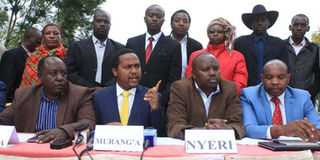Party mergers can cement harmony and cohesion

James Mwangi (in yellow tie) addresses journalists on behalf of grassroots leaders from Mount Kenya from six different political parties at a press conference in which they talked about party mergers at the White Rhino Hotel in Nyeri Town on July 13, 2016. PHOTO | JOSEPH KANYI | NATION MEDIA GROUP
What you need to know:
- I look forward to a country with a maximum of three political parties with different ideologies so that Kenyans can have valuable options.
- These parties must have elaborate structures that advance shared political beliefs. It is a sure way to unite this country.
Since the advent of multi-partyism in 1992, it has been assumed that the presence of many political parties is an indicator of widening democratic space.
In Kenya, the freedom to have optional parties that one can join when their interests are not catered for in their parties is often viewed as the epitome of democracy.
Yet, it is evident political parties have been reduced to mere vehicles for ascending to power. Every election year, parties are hurriedly formed only to be disbanded a short while later.
Whichever way the election goes, either a loss or a win, their value dwindles.
One cause of this high turn-over of parties is partly because they are, in the first place, created to fulfil very partisan and often personal political ends.
We in Jubilee are yearning to change this narrative. In 2013, we had a bigger agenda than winning the election and for this, were committed to fronting a stronger party in 2017.
It is now a foregone conclusion that The National Alliance and the United Republican Party will be joined by five other parties to form the Jubilee Party of Kenya in a matter of weeks.
New Ford Kenya has already led the way by dissolving itself and awaits a ratification of this decision by their national governing council.
I vouch for a strong party that will run Jubilee’s full political cycle and beyond.
Most of our parties exist on a pure lie that they cater for the interests of certain regions or ethnic groups. This is not how to build a cosmopolitan country whose foundation of peace and stability is a paramount indicator of a functional political system.
Harmonisation of ideals of like-minded parties is a great step towards bridging the unfortunate reduction of political parties to avenues of ethnic bigotry and personal gratification.
The new party will, of course, face a myriad of challenges but the principle should be uniting different regional, ethnic and political aspirations.
By merging parties, leadership of smaller parties will earn a legitimate stake in government short of the “begging bowl syndrome” that characterises losing parties in post-election deal making processes.
In one swoop, the new party will bury the reality that our parties have an inclination to regions and specific ethnic groups.
In crafting this big political house, prominence must be given to a robust structure that entrenches a common shared vision whose fruits can be seen in the near future.
LONG-TERM AGENDA
The common long-term agenda should be able to outlive the next two elections in a manner that does not breed divisions or is prone to interference by both internal and external subversive forces.
It should be a party accommodative of democratic ideals such as fairness in party activities, especially primaries, freedom of expression and respect for individuals as well as the Constitution.
At the moment, it looks grim for any government to have an inferior majority. One big party will avoid pitfalls of presidential votes going to one basket and parliamentary ones to a different party. The time wasted and political grandstanding that such outcomes give rise to will be reduced to a large extent.
Merging will also substantially cut the overall budget of operations, meaning the available resources can be channelled to more politically useful engagements such as civic education which has been poorly executed in the past.
The merger of Jubilee parties is an indicator the coalition leaders are committed to jointly steering this country towards a future of social-econo-political prosperity.
Party mergers should not be seen through the narrow prism of undermining democracy, but as a tool to cement the fragile political peace and cohesion among different communities.
The Opposition ought to take cognisance of the merger principle. Their leadership under the conglomeration of three parties headed by leaders with distinct ideologies can at best be a plot to hoodwink others that their man will be nominated as presidential flag-bearer.
I look forward to a country with a maximum of three political parties with different ideologies so that Kenyans can have valuable options.
These parties must have elaborate structures that advance shared political beliefs. It is a sure way to unite this country.
Dr Njogu Barua is the Member of Parliament for Gichugu; [email protected].



